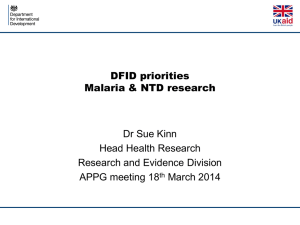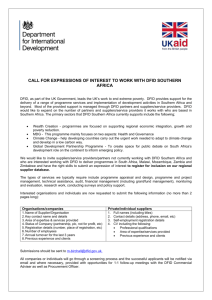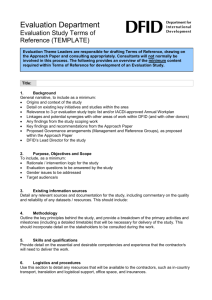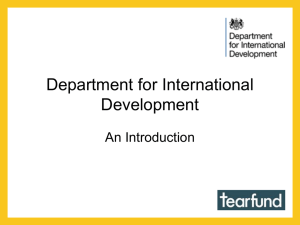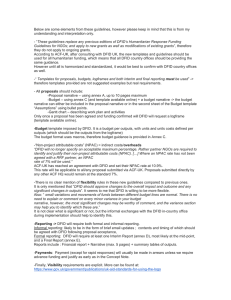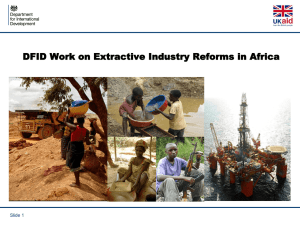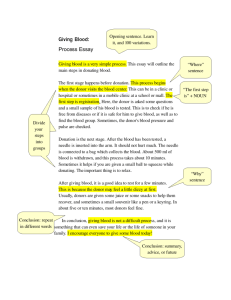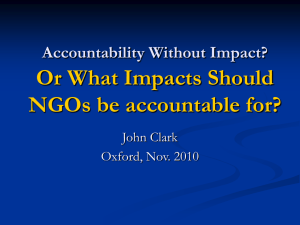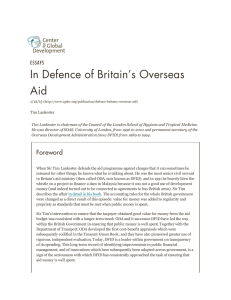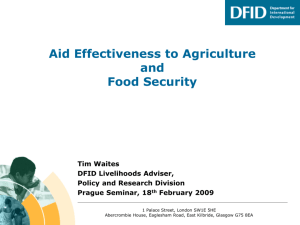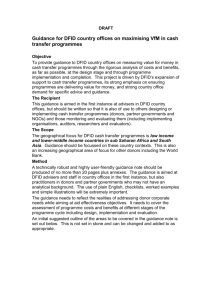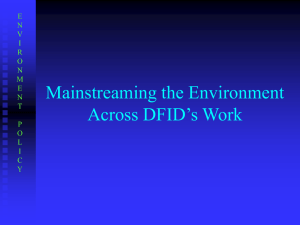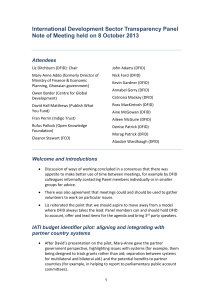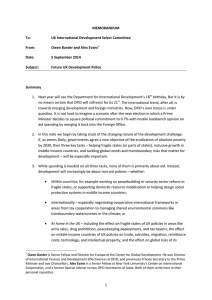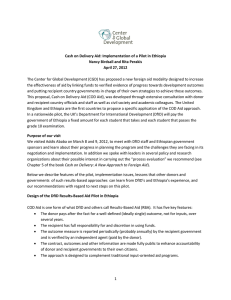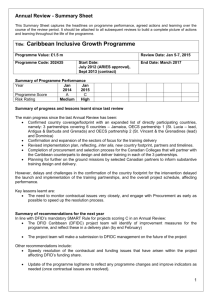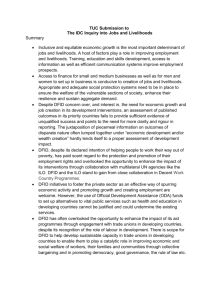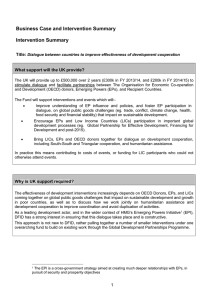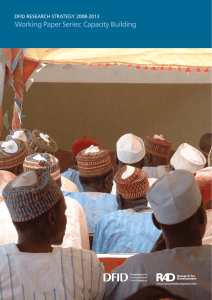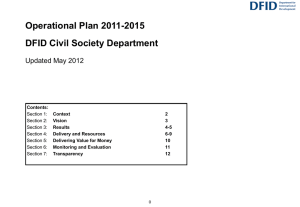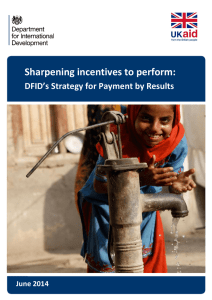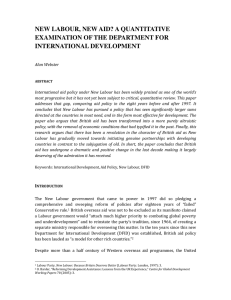The International Partnership Against Poverty: Speaking
advertisement
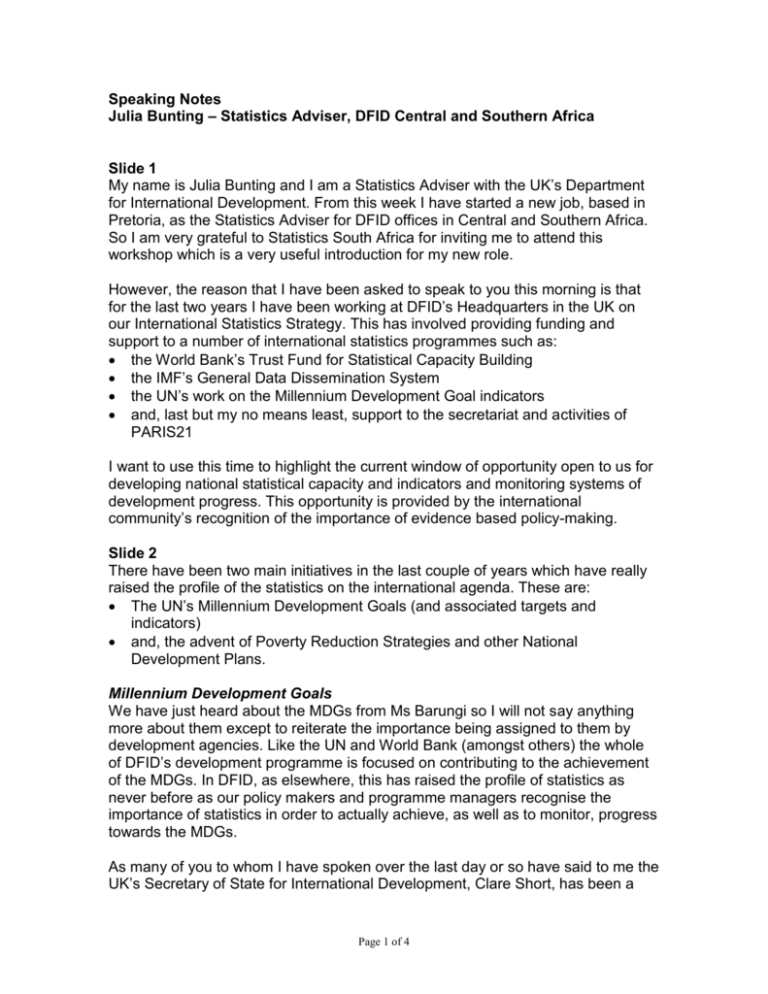
Speaking Notes Julia Bunting – Statistics Adviser, DFID Central and Southern Africa Slide 1 My name is Julia Bunting and I am a Statistics Adviser with the UK’s Department for International Development. From this week I have started a new job, based in Pretoria, as the Statistics Adviser for DFID offices in Central and Southern Africa. So I am very grateful to Statistics South Africa for inviting me to attend this workshop which is a very useful introduction for my new role. However, the reason that I have been asked to speak to you this morning is that for the last two years I have been working at DFID’s Headquarters in the UK on our International Statistics Strategy. This has involved providing funding and support to a number of international statistics programmes such as: the World Bank’s Trust Fund for Statistical Capacity Building the IMF’s General Data Dissemination System the UN’s work on the Millennium Development Goal indicators and, last but my no means least, support to the secretariat and activities of PARIS21 I want to use this time to highlight the current window of opportunity open to us for developing national statistical capacity and indicators and monitoring systems of development progress. This opportunity is provided by the international community’s recognition of the importance of evidence based policy-making. Slide 2 There have been two main initiatives in the last couple of years which have really raised the profile of the statistics on the international agenda. These are: The UN’s Millennium Development Goals (and associated targets and indicators) and, the advent of Poverty Reduction Strategies and other National Development Plans. Millennium Development Goals We have just heard about the MDGs from Ms Barungi so I will not say anything more about them except to reiterate the importance being assigned to them by development agencies. Like the UN and World Bank (amongst others) the whole of DFID’s development programme is focused on contributing to the achievement of the MDGs. In DFID, as elsewhere, this has raised the profile of statistics as never before as our policy makers and programme managers recognise the importance of statistics in order to actually achieve, as well as to monitor, progress towards the MDGs. As many of you to whom I have spoken over the last day or so have said to me the UK’s Secretary of State for International Development, Clare Short, has been a Page 1 of 4 key advocate of the importance of statistics for international development. In fact, the reason that Mary Strode from the PARIS21 Secretariat is not with us today is that she has flown to Pretoria to oversee the video recording of an interview, that Clare Short has agreed to do, on the importance of statistics for international development. This interview will be used by PARIS21, along with extracts from this workshop and an interview held with Mr Manuel yesterday, to produce an advocacy video on the importance of supporting and investing in the development of national statistical systems. In the same way that Mr Manuel recognises the importance of statistics to demonstrate the success of South Africa’s development programmes over the last 8 years, Clare Short has recognised the need to have statistics to demonstrate that national and international development efforts are really helping to change the lives of the 1.2 billion people living in extreme poverty. At a meeting of DFID’s statistics advisers’ last month she said she was prepared to commit more of DFID’s resources, and encourage other international agencies to do likewise, in order to ensure that national governments and the international community have the statistics they need to achieve and monitor progress towards the Millennium Development Goals. Statisticians need to seize this opportunity because if we don’t manage to demonstrate over the next couple of years that we can rise to such a challenge the opportunity for real progress in statistics will be lost. PRSPs and other National Development Plans I think that many people in this room will recognise that the projects and programmes of development agencies have not always been in line with national governments’ own priorities and have even distorted them. However, donors are now recognising the need to ‘buy into’ countries Poverty Reduction Strategies and other National Development Plans. In DFID, a lot of thought is being given to how the indicators and monitoring systems being used by national governments to monitor their own achievements can also be used to monitor our programmes and policies. This is in part a result of the increasing recognition of the burden that development agencies have placed on national governments to provide reports on individual projects. I heard once that in one country (I think it was Tanzania) they had prepared over 9,000 separate reports in one year to meet the demands of donor agencies; I hope that this is not a true statistic but I fear that it may be. Anyway, because of the change of emphasis from donor led projects to supporting national governments own development strategies, development agencies are recognising the need to assist countries in developing their statistical capacity and monitoring systems. This leads me on to another development which also has the potential to increase the demand for, and funding of, national statistical systems. Page 2 of 4 Slide 3 Direct Budgetary Support DFID, like some other development agencies, is gradually moving from a project and programme based approach to what is known as Direct Budgetary Support. I said earlier that donor projects have not always been in line with government’s own priorities and may have even distorted them. The idea behind Direct Budgetary Support is to get away from the traditional project and programme approach which has undermined rather than strengthened government’s own capacity to a process which actually contributes to capacity building. With Direct Budgetary support donors contribute directly to the governments central budget. In essence, donors agree 3-5 years of financial assistance (to provide stability and facilitate national planning) and then just basically provide one cheque a year; of course it is not quiet this simplistic! National governments can then use this additional money along with their own national budgets to fund their priority areas. The funnelling of donor assistance through the government system, rather than as an add on to it, contributes to the building of national systems and strengthens national capacity. One may have thought that Direct Budgetary Support would reduce donors’ demand for information because there would be only one ‘project’ to monitor; but, in fact it likely to increase demand. Not the demand for project reports but the demand for national statistics. This is because of the need for accountability. There are two basic forms of accountability: Firstly, public accountability by national governments to their people. For example, information on how decisions are made, resources are allocated and progress monitored. This is part of the good governance agenda. And secondly, public accountability by donor agencies to their funders. DFID is accountable through the UK Ministry of Finance to the UK public for money spent. Therefore we also need to demonstrate that our money is being used effectively and efficiently and to highlight successes. Performance Monitoring and Performance Management Another issue that I just want to touch on is Performance Monitoring and Performance Management. As I mentioned earlier indicators are needed to achieve, as well as to monitor, development progress. But, it is not sufficient to just have performance monitoring systems (i.e. technical systems) there also needs to be performance management systems (i.e. political and policy processes in place). By this I mean that there needs to be a feedback loop between policy formulation, policy implementation and policy refinement. Donors are increasingly interested in funding, not the routine collection of data, but the analysis and dissemination of information so that it can be used in the formulation and management of policy and can contribute to public accountability. Page 3 of 4 South-South Co-operation The final point that I want to make is in relation to technical assistance. In many countries (especially South Africa) donor money makes only a small contribution to the national budget and the focus of donor assistance is on technical co-operation rather than on development aid. However, technical co-operation is not just about hiring international consultants. There is increasing recognition of the importance of South-South Co-operation. I am delighted to see and hear that South Africa is leading the way in demonstrating the important role that South-South co-operation has to play. At this workshop we are joined by colleagues from a number of SADC countries and by experts from across Africa in order to share experiences and best practice. I have been hearing about joint work being done between Kenya and Statistics South Africa in relation to the processing of the 2001 census data. We have also heard about the strong relationship and collaboration being formed between the Ugandan Bureau of Statistics (UBOS) and Statistics South Africa. I am sure there are many other examples. From what I have seen and heard so far I think I am going to have a very exciting three years in my new post. I look forward to further opportunities to work with you all. Julia Bunting Statistics Adviser DFID Central and Southern Africa 208 Infotech Building 1090 Arcadia Street Hatfield 0083 Pretoria Tel: +27 (0)12 431 2100 Fax: +27 (0)12 342 3429 e-mail: j-bunting@dfid.gov.uk Page 4 of 4
